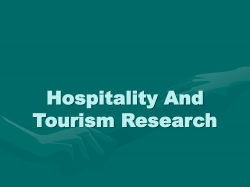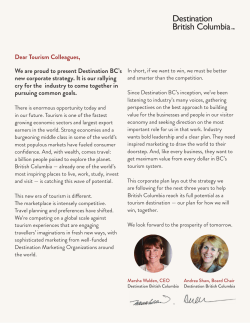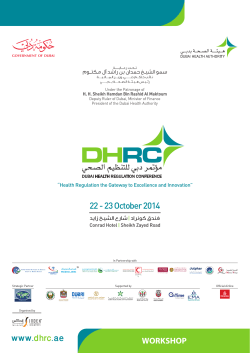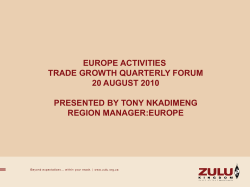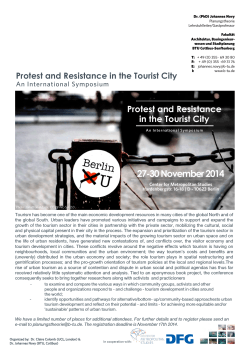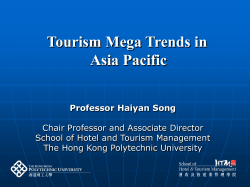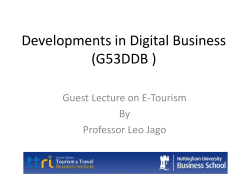
T H E
Ελληνική T TH HE EE EN NG GL LIIS SH HE ED DIIT TIIO ON N ## 1 14 4 T TH HEE BBU ULLLLEET TIIN NO OFF IIN NT TEERRN NA AT TIIO ON NA ALL A AN ND D EEU URRO OPPEEA AN NA AFFFFA AIIRRS S && D DEEV VEELLO OPPM MEEN NT T PPLLA AN NN NIIN NG G O OFF LLO OCCA ALL G GO OV VEERRN NM MEEN NT T H HEELLLLEEN NIICC RREEPPU UBBLLIICC M MIIN NIISSTTRRYY O OFF IIN NTTEERRIIO ORR Νο 53 EDITORIAL 5thSession November 2014 Towards an EU-wide Maritime and Coastal Tourism Strategy As part of EU's Blue Growth strategy, the coastal and maritime tourism sector has been identified as an area with special potential to foster a smart, sustainable and inclusive Europe. It is the biggest maritime sector in terms of gross value added and employment and, according to the Blue Growth Study, is expected to grow by 2-3% by 2020. In 2012, Cruise tourism alone represents 330,000 jobs and a direct turnover of €15.5 billion and is expected to grow. With Europe's maritime tourism sector employing 3.2 million people generating €183 billion each year, the Committee of the Regions adopted an opinion on a European Strategy for Coastal and Maritime Tourism reacting to recent European Commission's proposals on the issue. Actually, what is urgently needed is a far more coherent and ambitious tourism strategy between local, national and EU governments. Crucially, bolstering the tourism sector requires a strategy designed to meet the specific needs of each coastal and maritime region. The EU should focus its efforts to encourage those coastal regions whose economies rely so heavily on tourism to exploit their unique local Contents and regional services and products, whilst protecting the environment. European and International Funding Programmes 2 By promoting the diversification of the Business and Development Planning 3 sector the problem of seasonality could be tackled attracting tourists all year around and economies. so boosting local The Voice of the E.G.T.C.s 4 EU funded Projects of Greek Local Authorities 6 International and European Conferences 7 European Affairs 10 International Affairs 12 Consultations 13 The Seminars of EIPA The Library of Local Government 14 15 Issue 53 THE BULLETIN OF INTERNATIONAL AND EUROPEAN AFFAIRS & DEVELOPMENT PLANNING OF LOCAL GOVERNMENT European and International Funding Programmes Call for Proposals-Deadlines particular but not limited to 11/2014 hate crime and hate speech. They could address for example the use of criminal law as a response to these phenomena as well as other tools (e.g. ethical codes, community- building, awareness raising). Mutual learning and cooperation activities; in particular, projects aiming at sharing concrete best practices that are likely to increase efficient prevention as well as effective responses to racist, xenophobic and homophobic incidents, by means of criminal law and by other means will be funded. (b) Monitoring and reporting on hate crime and online hate speech (HATE) The projects should contribute to the development of efficient monitoring and reporting mechanisms for racist, xenophobic and homophobic hate crime and on-line hate speech and to improve the existing monitoring/reporting mechanisms. They will thereby Rights, Equality and Citizenship Programme, 2014-2020: Action grants to support projects to prevent and combat racism, xenophobia, homophobia and other forms of intolerance support the effective, comprehensive and consistent implementation, application and monitoring of Framework Decision 2008/913/JHA on combating certain forms and expressions of racism and xenophobia by means of criminal law. The indicative available budget under this call for proposals is: For the BEST priority: EUR 1.500.000. For the HATE priority: EUR 3.850.000. The EU grant requested cannot be lower than EUR 300.000. There This call for proposals for action grants is based is no upper limit. on the 2014annual work programme of the The project must be transnational and must be Rights, Equality and Citizenship Programme (REC submitted by a partnership of eligible organisations Programme). It aims to co-fund transnational (i.e. applicant and partners) from at least five different projects which are in line with the specific eligible countries. objective of the REC Programme to prevent and Deadline: 12 November combat racism, xenophobia, homophobia and Additional Information other forms of intolerance. http://ec.europa.eu/justice/grants1/files/2014_rrac_ The proposals under this call shall focus on the ag/just_2014_rrac_ag_call_notice.pdf priorities described below: (a) Best practices to prevent and combat racism, xenophobia, homophobia and other forms of intolerance (BEST) The proposals submitted under this priority should focus on the exchange of best practices to prevent and combat racism, xenophobia and homophobia and other forms of intolerance, in 2 2 THE BULLETIN OF INTERNATIONAL AND EUROPEAN AFFAIRS & DEVELOPMENT PLANNING OF LOCAL GOVERNMENT Issue 53 Business & Development Planning 11/2014 Nevertheless, there are key essential elements regions and cities need to complete to be able to develop a coherence strategy: (a) Understanding the situation of the region/city; (b) Understanding its strengths and weaknesses; (c) Developing a vision for surrounding region based understanding required the the city within its on its strengths, and inputs to achieve ambitious but realistic goals; (d) The goals need to be based on Key Performance Strategic EU funding planning for Smart Cities Indicators (KPIs), which should allow more effective programing and tracking of progress. Figure shows how an urban plan can be linked to support from a variety of funding sources. The ERDF The impact of the new EU funding mechanisms on urban funds can support JESSICA-style instruments for smart city development will largely depend on the infrastructure development, which can be linked to national, regional and local authorities. The EU energy and transport grids supported by the ERFD and funding mechanisms offer regions an opportunity Cohesion Fund, as well as human capital development to set their priorities in line with the development by the ESF. The support instrument COSME for SMEs of smart regions and smart cities. In fact, the can also provide support, in particular for innovative thematic concentration emphasis for the new SMEs. programming period provides the right framework. demonstration The financial deployment. While some of these funds are managed mechanisms to develop smart and sustainable by the regional authorities, some others are not regions may also potentially contribute, which (COSME, Horizon 2020), which makes programming should include a strong urban element if the more strategy seeks to achieve tangible impacts. commitment It is thus in the hands of the national and regional collaborate with the private sector. In fact, without the authorities to design the right framework and strong involvement of local stakeholders integrated involve the local authorities and the municipalities planning cannot be successful. possibility to use innovative Finally Horizon 2020 projects complex. on These the and funds part of can be new require city used for technology a strong authorities to to work in designing a coherent smart economy not only on infrastructures, but also on building the services and the human resources for the future. This requires a strong local engagement and integrated approaches to planning. Many regional programmes in the past have lacked strategic focus and integrated actions. This aspect was already recognised for the 2007-2013 programming period, which led to a request by the European Commission for more strategic planning. The climate challenge and the economic crisis have further reinforced this need. The results are now more focused, and strategic proposals with a wider and more flexible set of instruments are available to the regions. 3 3 THE BULLETIN OF INTERNATIONAL AND EUROPEAN AFFAIRS & DEVELOPMENT PLANNING OF LOCAL GOVERNMENT Issue 53 11/2014 The Voice of E.G.T.C.s The EGTC EFXINI POLI - SolidarCity at the OPEN DAYS 2014 Three projects were presented, one in the social sector and two in Environmental Management. Dr The interregional cooperation projects carried out Nikos by EGTC EFXINI POLI - Network of European Cities referring to a proposal for cooperation on the for Sustainable Development, were presented by thematic topic of "Innovation in Employment". the General Director, Dr. Nikos Krimnianiotis, in the Precisely, the three territorial cooperation projects workshop organized by the Committee of the presented and the project idea for Innovative Regions (CoR) during the OPEN DAYS 2014 in Employment are briefly presented, below: Krimnianiotis closed his presentation Brussels. The workshop’s title was “The EGTC in the long haul, Interreg and other Opportunities”. Its 1. SOLIDARCITY, The role and involvement of Local goal had been the discussion of interregional Authorities cooperation among EGTCs of Europe and the (recently completed). cooperation opportunities offered by the upcoming It had been a project financed through INTERREG programme IVC INTERREG EUROPE. Dr Nikos to the programme Employment with partners rate increase from Greece, Krimnianiotis, started his speech with a brief Bulgaria, Romania, Italy, United Kingdom and presentation of the course of the EGTC EFXINI POLI Finland. Pilot actions were implemented in Greece, from its foundation in 1995 as Network Greek Bulgaria and Italy and two of the outputs available Municipalities and the conversion of an EGTC in are the Guide for creation of Time Banks and 2012, until today. “SolidarCity Houses” Guide. Later, he referred to several Interregional projects that EGTC EFXINI POLI takes part in, on behalf of its 2. ZEROWASTE PRO Solid Waste Management members, either as a member of a partnership or It is a project financed through MED 2007-2013 as a Lead Partner. CAPITALISATION programme with partners from Greece, Italy, Slovenia, Spain, Croatia, BosniaHerzegovina, France and Malta and key deliverables: - Green Solutions Guide for waste management - Training Government guide in for green executives solutions of for Local waste management. - Manual for online tool that helps in measuring the CO2 footprint of the Municipalities Regions. 4 4 and THE BULLETIN OF INTERNATIONAL AND EUROPEAN AFFAIRS & DEVELOPMENT PLANNING OF LOCAL GOVERNMENT Issue 53 11/2014 The proposal of Dr. Nikos Krimnianiotis to the participants had been the cooperation of EGTCs of Southern Europe with EGTCs of Northern Europe in order to implement a pilot project, areas of the South will produce medical herbs since they have the appropriate climatological conditions while the areas of Northern Europe, will work on the Industrial processing of essential oils (A/F) to absorb the quantity of the South. The idea is believed to be sustainable and has been positively assessed in advance by experts. The method of BUSINESS INCUBATORS will be applied. - White Paper for SMEs and Industrial Areas in relation to the production and management of their waste 3. Regions for Recycling - R4R, Solid Waste Management It is a project financed through INTERREG IVC programme, with partners from Greece, Belgium, France, Portugal, Bulgaria, Croatia, Romania, Spain, Estonia, Austria, Ireland, and Denmark with the main deliverable: "Development of a methodology by which each region will evaluate the performance of recycling and tool that will help to compare their recycling performances at European Level". The INNOVATION on EMPLOYMENT, lies upon the development of an incubator system which will need only an initial funding and no additional funding, while at the same time new beneficiaries will be able to be integrated every one or two years. The result in 10 years will be: a) doubling of the number of employees b) a GUARANTEED EMPLOYMENT for at least 10 years President Van Staa asked to discuss the proposal at a special meeting of the EGTC Platform in January 2015 devoted exclusively to the topic of EGTC and Employment. 4. INNOVATION IN EMPLOYMENT The idea “Innovation in Employment” has a direct connection with the Guaranteed Employment after Vocational Training. Having a huge experience in the field of vocational training and deep knowledge of the ESF resources use, we know in practice that employment after training is minimal to zero. The EGTC EFXINI POLI, trying to find a way out, drawing on years of experience in the implementation of a variety of innovative employment projects under the Community Initiatives and having as a basic rule to use only existing resources (physical and financial), developed, together with its members, a study-proposal regarding Ten-year Guaranteed Employment in the primary and secondary sectors of the Economy. The idea is based on the cultivation of the abandoned public land with Herbs or Medicinal plants following specific methods of organizing work. 5 5 THE BULLETIN OF INTERNATIONAL AND EUROPEAN AFFAIRS & DEVELOPMENT PLANNING OF LOCAL GOVERNMENT Issue 53 11/2014 EU funded Projects of Greek Local Authorities Municpality of Alimos: PLAY EUROPE Promotion of the Leadership of Active Youth in Europe (Europe for Citizens, 2007-2013) PLAY Europe project intends to promote active leadership at European level among the youth of different EU countries, in order to improve the competence and skills of future political leaders towards European Agenda understanding and setting. This action will be implemented through a permanent cooperation among public authorities coordinated by ELISAN network and composed by public events, seminars, workshop, public debates and study visits. The participants (young people aged 18-30) will be asked to update the Europe 2020 objectives & themes in the field of Social Policies, in order to prepare a new document called Social Europe Agenda 27. The entire project will be accompanied by a strong dissemination and raise awareness action leaded by ELISAN all over Europe. Coordinator: ELISAN - European Local Inclusion and Social Action Network (IT). Partner countries: FR, BE, GR, NL Venue: Venice (IT), Marseille (FR), Ghent, Brussels (BE), Alimos Grant awarded: 144.000 € (GR), Rotterdam (NL) In a wonderful Greek setting , between Athens and Alimos, took place on 17-20 September, the fifth event of the Play Europe project. The young European leaders faced this time the issue of volunteering and citizenship. As in other occasions, several and very interesting inputs were brought. The theme of volunteering was analysed under various angles, examining the personal, social, organizational, and economical aspects. The interventions and the work of the group showed clearly that the initiatives supported by volunteers, particularly concerning the social sphere, are essential and connected not only to the target they address, but also to the economic and local governance. The youngsters have also stressed the key role of volunteers to help different organizations to carry out their tasks for internal management and external relations. In addition volunteers are also essential to support the delivery of better results thanks to the transfer of new skills and knowledge. Moreover the analysis on the concept of leadership is progressing and the Play Europe young leaders are currently making a video summarizing the findings from the research carried out 6 during the course of the 6 project. THE BULLETIN OF INTERNATIONAL AND EUROPEAN AFFAIRS & DEVELOPMENT PLANNING OF LOCAL GOVERNMENT Issue 53 11/2014 International and Knowledge and education are the foundations to European Conferences That is why the local authority, as strategic- URBAN INFRASTRUCTURE 2014 (London, 13 November) development and social inclusion in our society. territorial goal leader, takes a broad view of education, beyond school and based on the idea of an educating city, where education becomes a tool for, a driving force to and an influence on personal and collective development, social inclusion and Building on the success of past Future Cities events, greater community coexistence and solidarity. the conference will look at how the cities of the future Hence the theme of the congress: The Educating can innovate to provide world class, intelligent City is an Inclusive City. Additional Information: http://iaec2014.bcn.cat/en/ Going Green – CARE INNOVATION 2014 (Vienna, 17-20 November) The International CARE Electronics Office is pleased to announce the Going Green – CARE INNOVATION 2014 conference and exhibition on Electronics and infrastructure. The participants will be able to meet the Environment. It will take place in Schoenbrunn and network with 150+ authorities in urban planning, infrastructure, housing, construction, transport, energy and architecture for a day of insight, debate and action. Additional Information: http://www.economistinsights.com/infrastructurecities/event/urban-infrastructure-2014 An Educating City is an Inclusive City (Barcelona, 13-16 November) Palace Conference Centre Vienna (Austria), which is situated in the Apothecaries’ Wing of the famous building. This Symposium is the only platform for presenting the up-to-date progress on sustainable development and the development of eco-efficient electr(on)ic & automotive products. Barcelona will be playing host to the 13th International Congress of Educating Cities in 2014, to mark the 20th Additional Information: http://www.care-electronics.net/CI2014/ anniversary of the Association's founding in Barcelona, Rethinking the present where the presidency has been held ever since. and future of urban growth (Barcelona, 18-20 November) Urban development is examined along six main tracks: smart society, technology, governance, energy, mobility and sustainable city. More than 300 of the world's top experts to debate their visions of sustainable and efficient city development at the Congress. 7 7 Issue 53 THE BULLETIN OF INTERNATIONAL AND EUROPEAN AFFAIRS & DEVELOPMENT PLANNING OF LOCAL GOVERNMENT 11/2014 GREENCITY 2014 (Paris, 18-19 November) GreenCity is your gateway to sustainable city expertise in and around Paris, in the heart of this metropolis. This milestone international gathering is an opportunity for businesses, scientists and This is a senior level forum for debating, sharing knowledge and best practice, and creating synergies between the main stakeholders in the smart cities movement. Additional Information: http://www.smartcityexpo.com/en/congress URBAN FUTURE Global Conference (Graz, 18-19 November) institutional The URBAN FUTURE global conference is one of the world’s most influential events for sustainable city development and will help to shape a better future for cities. In cooperation with the United Nations, the stakeholders to spend two days enjoying exchanges. GreenCity 2014 will take place during the build-up to the 2015 Climate Change Conference (COP21) in Paris. Additional Information: http://www.greencity-event.com/en/ event will host hundreds of delegates from around the world. Decision Models for Smarter Cities (Brussels, 18 November) The emergence of new technologies is key to achieveing sustainable mobility in smart cities. At this conference experts from innovation companies How cities deal with the projected growth, and how they can meet the new demands on infrastructure, resources, energy, mobility and housing needs without destroying their own livelihood, are without doubt the issues of the future. The URBAN FUTURE global conference focuses on exactly those issues: it is one of the world’s most influential events for sustainable city development. Influential, because the event will go many steps further by enabling decision makers to develop cities in a much more sustainable way. Additional Information: http://www.urban-future.at/en 8 and researchers will share latest ideas and developments in the field of intelligent mobility, sharing insights into how we will move around in cities tomorrow, and what future vehicles will look like. Additional Information: http://www.imobilitychallenge.eu/roadshow/view/i d/15 8 Issue 53 THE BULLETIN OF INTERNATIONAL AND EUROPEAN AFFAIRS & DEVELOPMENT PLANNING OF LOCAL GOVERNMENT 11/2014 Launch Conference of the EU Strategy for the Adriatic and Ionian Region (EUSAIR) (Brussels, 18 November) The Launch Conference of the EU Strategy for the Adriatic and Ionian Region (EUSAIR), which is organised by the Italian Presidency of the Council of the European Union, in cooperation with the European Commission, and together with the Adriatic and Ionian Initiative and Marche Region (as Presidency of the Adriatic-Ionian Interregional Group in the Committee of the Regions), is gathering all key actors to create the framework for its implementa- Against the background of a rapidly changing social, economic and environmental context in the 21st century, the Guangzhou Award contributes to the progress of city performances by promoting innovations in the public sector and presenting a platform for cities and regions around the world to share and disseminate their achievements. Additional Information: http://www.guangzhouaward.org/en/index.html 2014 Annual Polis Conference (Madrid, 27-28 November) tion. The governance and management structures of the Strategy, currently under development, will be organised around its four pillars, namely: "Blue Growth", "Connecting the Region" (Transport and The 2014 Polis Conference is a major platform for cities, metropolitan areas and regions to exchange on their transport challenges. High-level plenary Energy), "Environmental Quality" and "Sustainable Tourism". Additional Information: http://ec.europa.eu/regional_policy/conferences/adr iat_ionian/launch/index_en.cfm Guangzhou International Award for Urban Innovation (Guangzhou, 27-29 November) The concept of the Guangzhou International Award for Urban Innovation (abbreviated as Guangzhou Award) is cooperation derived from with United the city's Cities long-term and Local Governments (UCLG) from its foundation in 2004 and with the World Association of Major Metropolises (Metropolis) since 1993. sessions are complemented by technical sessions showing innovation in policy and practice across the transport spectrum. Additional Information: http://ec.europa.eu/regional_policy/conferences/a driat_ionian/launch/index_en.cfm 9 9 THE BULLETIN OF INTERNATIONAL AND EUROPEAN AFFAIRS & DEVELOPMENT PLANNING OF LOCAL GOVERNMENT Issue 53 11/2014 ,, EU coastal tourism strategy must go local European Affairs to boost growth and create jobs European Entrepreneurial Region (EER) The Committee of the Regions has called for an EU-wide maritime and coastal tourism strategy to The Committee of the Regions has launched the be launched to tackle slow economic growth and 2016 edition of the European Entrepreneurial persistently high levels of youth unemployment in Region or city, Europe. The Committee – the EU's assembly of local regardless of their size or wealth, with outstanding, and regional authorities – also argued that the EU future-oriented can must go further to support the diversification of apply until 16 March 2015. The most successful, the sector, improve cooperation between Europe's forward-looking and promising strategies will be coastal regions, and create a more coherent plan rewarded and monitored over the coming two between local, national and EU governments. (EER) Award. Any EU region entrepreneurial strategies years. An Info Day about the Award will be held (and web-streamed) on 23 October. The EER initiative was launched by the Committee of the Regions (CoR) in 2009 in order to contribute to mainstreaming the EU Small Business Act principles at regional and local level, as well as to boost the achievement of the goals of the EU's growth strategy - Europe 2020 - in the fields of innovation regional and entrepreneurship. authorities are given Local the and chance to demonstrate their commitment to promoting SMEs and entrepreneurs as key players in strengthening the economy and harnessing their potential to create growth and jobs. The competition is open to all EU territories below the level of the Member State that are endowed with competences at a political level and able to implement an overall entrepreneurial vision. They could be successful or lagging behind but commitment to implementing changes to develop their entrepreneurial potential. Communities, autonomous communities, departments, Länder, provinces, counties, metropolitan areas, large cities, as well as cross-border territories such as EGTCs and Euro-regions may apply. 10 With Europe's maritime tourism sector employing 3.2 million people generating €183 billion each year, the Committee of the Regions adopted an opinion on a European Strategy for Coastal and Maritime Tourism reacting to recent European Commission's proposals on the issue. Launching an EU-wide tourism strategy to contribute to delivering so-called "Blue Growth" can create much needed jobs, the Committee argues, but its success hinges on involving a range of different policies including environment, transport and training. The Committee also points to the importance of improving regional cooperation to share knowledge on tourism and raises serious concerns about the poor connections and transport infrastructure for some coastal regions - especially those so reliant on air transport, such as islands - which is restricting the flow of tourists and subsequently holding back growth. Additional Information: http://cor.europa.eu/en/news/Pages/coastaltourism-strategy.aspx 10 Issue 53 11/2014 THE BULLETIN OF INTERNATIONAL AND EUROPEAN AFFAIRS & DEVELOPMENT PLANNING OF LOCAL GOVERNMENT 6-27 Regional implementation of the SBA In order for SMEs to flourish, a winning concept which boosts competitiveness and shapes a sound business environment is vital. With 23 Million SMEs spread out all over Europe, this is influenced in many ways, not only from EU and National level but also from Regional policies. And to maintain a broad base of SMEs is very important for the economic tissue of a region and thus for its wealth and sustainability. The EU contributes to its Member States', as well as its regions', success in this area by providing analysis, inspiration, programs and initiatives. The EU Strategy for the Adriatic and Ionian Region was endorsed by Europe's leaders The European Commission has welcomed the endorsement by EU leaders of the new EU Strategy for the Adriatic and Ionian Region (EUSAIR) on 24 October 2014. The decision by the European Council gives the green light to the Strategy which was proposed by the European Commission last June. The Strategy covers four EU Member States (Croatia, Greece, Italy and Slovenia) alongside Albania, Bosnia and Herzegovina, Montenegro and Serbia. Comprising some 70 million residents, the EU Strategy for the Adriatic and Ionian Region(EUSAIR) paves the way for closer cooperation among the member countries in four key areas: 1) Blue Growth, 2) Connecting the Region, 3) Environmental Quality, and 4) Sustainable tourism. Building on the experience of the existing macro-regional strategies: the EU Strategy for the Baltic Sea Region and the EU Strategy for the Danube Region, EUSAIR offers a framework for mobilising and aligning existing EU, pre-accession and national funding instruments, with commonly agreed strategic objectives. The participating countries are currently identifying the national and sectoral coordinators that will take care of the Strategy's implementation at a national and macro-regional level. This guide was prepared for policy makers, stakeholders and managing authorities, especially at regional level, who want to implement the measures and recommendations of the Small Business Act at their level, Additional Information: http://bookshop.europa.eu/en/how-to-usestructural-funds-for-sme-entrepreneurship-policypbNBBN13001/issues/?PublicationKey=NBBN13001& EditionKey=NBBN13001ENC_PDF&CatalogCategoryID =cKYKABsttvUAAAEjrpAY4e5L Additional Information: http://europa.eu/rapid/press-release_IP-141197_en.htm 11 11 THE BULLETIN OF INTERNATIONAL AND EUROPEAN AFFAIRS & DEVELOPMENT PLANNING OF LOCAL GOVERNMENT Issue 53 2014′s Best & Worst American Cities for International Affairs People with Disabilities Resilience.io International Platforma for tracking funds Resilience.io is an open-source, cloud-based regional platform, which gathers satellite/earth observation, open government and crowd- sourced economic, social and environmental data together in one place, in an understandable, palatable and visual format. Backed by an advanced systems model, resilience.io integrates human-ecological-economic calculates the current systems resource flows 11/2014 and When searching for a new city to call home, most people share a common list of priorities. Among their concerns are affordability, jobs, schools and attractions. But people with disabilities often have a larger list of considerations. Factors such as the accessibility of various facilities, the quality of health care and even the cleanliness of the air can take precedence. The availability of such elements allows them to play an important role in the community and make significant contributions to the economy. from economic, human and ecological activity and the impact on human well-being. With this base, it can be used to visualise and predict the outcome of different scenarios which results in better In the United States, people with disabilities bring planning and decision-making for a achieving valuable skill sets to the workplace that build upon the transformation to a more resilient city-region. strength and diversity of the American labor market. Importantly, resilience.io enables economically According to a U.S. Bureau of Labor Statistics report, a beneficial resource management to be funded little more than five million people with disabilities through new direct investment into a wide variety were employed in 2013. However, the unemployment of projects, which use and contribute to the data rate for those with a disability continues to be almost in the platform. It also insures against extreme double the rate for persons without a disability. In risks, especially in energy, water and food observance security. It will improve Disability Employment Awareness of Month, WalletHub identified the cities with the most complex integrated city-region systems, and suitable conditions for individuals with disabilities. We because is analyzed the 150 most populated cities across 23 key collaborative, it will reduce siloed thinking and metrics, ranging from the number of physicians per allow local users to make more robust decisions capita to the rate of employed people with disabilities about the needs of the economy, environment to park accessibility. By doing so, we aim to ease the and society. process of finding the best place to live while governance of understanding of resilience.io managing a disability. Additional Information: http://ecosequestrust.org/about/resilienceio-supported-by-the-ecologicalsequestration-trust/ 12 Additional Information: http://wallethub.com/edu/best-worst-cities-forpeople-with-disabilities/7164/ 12 THE BULLETIN OF INTERNATIONAL AND EUROPEAN AFFAIRS & DEVELOPMENT PLANNING OF LOCAL GOVERNMENT Issue 53 11/2014 Green paper on the Safety of Tourism Consultations Accommodation Services Although the safety of tourism accommodation services is the competence of Member States, the presence of a strong cross-border dimension in this type of service suggests a reflection on their quality and safety levels across Member States. Consumers should indeed expect to be able to purchase tourism accommodation services with confidence for their own safety regardless of their choice of accommodation or destination within the EU. The objective of this consultation is to gather input and quantifiable evidence from all relevant parties with an aim to evaluate fundamental aspects related to tourism accommodation safety: whether the existing instruments and their implementation throughout the EU are adequate and sufficient by measuring the nature and extent of the safety risks Ratification by the EU of the Minamata and their potential link to flaws or gaps in the Convention on Mercury current legislative framework, and to what extent they have an impact on the provision of such The aim of this consultation is to solicit stakeholders' input on specific issues related to the implementation of the Minamata Convention on Mercury. The results of the consultation will be used as input for the preparation of the Impact Assessment covering specific key areas where EU legislation may need to be amended such as: Import restrictions for metallic mercury from non-Parties to the Convention; services across borders as well as on SMEs and vulnerable consumers, in order to make a clear distinction of what objectives are best met at which level. Deadline: 30 November Additional information: http://ec.europa.eu/dgs/health_consumer/dgs_co nsultations/ca/consultation_20141130_tourism_en .htm Export ban for certain products containing mercury; Mercury use in new products and processes; Restrictions on certain processes where mercury is used; Mercury use in Artisanal and Small-scale Gold Mining (ASGM); Environmentally sound storage of nonwaste mercury stocks. Deadline: 14 November Additional information: http://ec.europa.eu/environment/consultations/m ercury_en.htm 13 13 Issue 53 THE BULLETIN OF INTERNATIONAL AND EUROPEAN AFFAIRS & DEVELOPMENT PLANNING OF LOCAL GOVERNMENT 11/2014 The Seminars of the Internal and External Audit of the EU Funded European Institute of Public Date: 24-26 November Administration (EIPA) Programmes and Projects Location: Barcelona Additional Information: http://seminars.eipa.eu/en/activities09/show/&tid=5577 The Internal Market for Services: The Services Package and its impacts on Public Administrations Date: 24-25 November Location: Barcelona Additional Information: http://seminars.eipa.eu/en/activities09/show/&tid=5611 Understanding EU Decision-Making: Principles, Procedures, Practice Date: 27-28 November Change in Public Administration? Yes We Can! Date: 17-18 November Location: Maastricht Additional Information: http://seminars.eipa.eu/en/activities09/show/&tid=5451 Location: Maastricht Additional Information: http://seminars.eipa.eu/en/activities09/show/&tid=5579 Working with Impact Assessment at EU Level Date: 20-21 November Location: Maastricht Additional Information: http://seminars.eipa.eu/en/activities09/show/&tid=5430 Internal and External Audit of the EU Funded Programmes and Projects Date: 24-26 November Location: Maastricht Additional Information: http://seminars.eipa.eu/en/activities09/show/&tid=5577 Europe on the Internet - Finding your Way through the European Information Jungle Date:24-25 November Location: Maastricht Additional Information: http://seminars.eipa.eu/en/activities09/show/&tid=5507 14 14 THE BULLETIN OF INTERNATIONAL AND EUROPEAN AFFAIRS & DEVELOPMENT PLANNING OF LOCAL GOVERNMENT Issue 53 Struggling The Library of Local Government Planning Regions: Sustainable Towards Cities More Giants: 11/2014 City-Region Governance in London, New York, and Paris, and Tokyo Equitable Development Pages: 344 P. Kantor, C. Lefevre Publisher: University of Minnesota Press, 2012 Struggling Giants examines the transformation of four of the most significant metropolises: London, New York, Paris, and Tokyo. This volume analyzes Pages: 322 K. Chapple Publisher: Routledge, the thorniest issues these sprawling city-regions have faced, including ameliorating social problems 2014 through public policies, the effect of globalization on Finally, a book about sustainability that fully accepts that the future will not be like the past. Boldly proclaiming that cities are inevitably moving toward livability, Chapple notes how traditional planning techniques cannot fully grapple with our changing demographics, the rise of the networked economy, and the shifting preferences of the next America. Utilizing the experience of the Bay Area – while making the appropriate caveats about the transportability of that experience -- she charts a different approach, one that addresses our distributional and environmental crises even as it neatly fits into an emerging economy that is both more regional and more entrepreneurial. local governance, and the relationships between local, regional, and national institutions. This ambitious comparison of the world’s four most important global city regions stands out on three counts: first, it moves from the focus on the central city characteristic of most global city studies to an explication of the dynamics of their broader regions; second, it deals with the question of the governability of these regions and the extent to which they control their own trajectories; and third, it deals with the politics that differentiates these regions from each other rather than assuming that similar economic structures necessarily produce like outcomes. It is a significant contribution to our understanding of urban political economy. 15 15 Issue 53 THE BULLETIN OF INTERNATIONAL AND EUROPEAN AFFAIRS & DEVELOPMENT PLANNING OF LOCAL GOVERNMENT 11/2014 The Bulletin of International and European Affairs & Development Planning of Local Government of the Hellenic Ministry of Interior is published and distributed on a monthly basis – except for the double summer issue - only in digital form. If you wish to subscribe to our bulletin, you can send us your contact details to the following e-mail address: a.karvounis@ypes.gr Ε λ λ η ν ικ ή HELLENIC REPUBLIC MINISTRY OF INTERIOR DIRECTORATE OF ECONOMIC AND DEVELOPMENT POLICY OF LOCAL GOVERNMENT DEPARTMENT OF DEVELOPMENT PROGRAMMES AND STATE SUBSIDIES Stadiou 27, P.C.10183 Athens Editor-in-chief: Antonios Karvounis, Ph.D., PMP© Ε-mail: a.karvounis@ypes.gr Website: http://www.ypes.gr/el/Ministry/Actions/deltio_diethnon_kai_europaikon_thematon/ 16 16
© Copyright 2025
